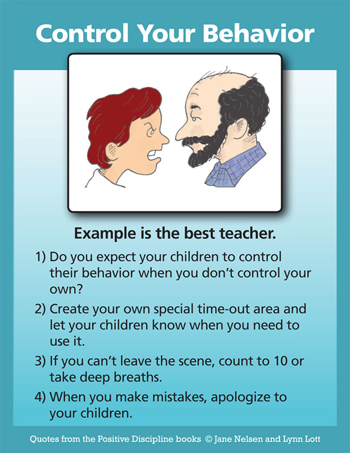Monday, September 15, 2014
Control Your Behavior
The Positive Discipline Tool Card of "Control Your Behavior" is sometimes easier said than done. Have you ever lost control of your behavior with your children? Listen to the following audio excerpt from Building Self-Esteem Through Positive Discipline as I discuss a time when I completely lost control with my daughter. (Click Here if you cannot see the audio player.)
Fortunately we can use the parenting tool of "Mistakes" to recover when we lose control of our behavior. But it is always better if we can find ways to avoid losing control in the first place. The suggestions listed on the tool card are:
1. Create your own special time-out area and let your children know when you need to use it.
Some parents are uncomfortable with this solution, especially when dealing with younger children. But if your children are older and you can set up this system in advance, it can be quite effective. It is nearly impossible to solve problems at the time of conflict when both the child and the parent have flipped their lid. The result is distance and hurt feelings. Usually followed by guilt!
Why not let your children know that you are taking a time out. Remove yourself from the situation and get centered before attempting to solve the problem. How you take your time-out is up to you. Maybe you will go to your room. Maybe you will go for a walk. Maybe call a close friend and discuss the problem. Whatever you decide, the important thing is to take time to cool off before addressing the problem.
2. If you can't leave the scene, count to 10 or take deep breaths.
This is a good solution if you have younger children or the situation requires your presence. It is also okay to share what you are feeling. "I'm so angry right now, I need to calm down before we talk." Kids need to know that what they feel is always okay, but what they do is not always okay. You model this by sharing your feelings without reacting to them and without blaming your children for your feelings. Avoid saying, "You make me so angry."
3. When you make mistakes, apologize to your children.
As you heard in the podcast above, I eventually calmed down and apologized to my daughter. Children are wonderfully forgiving when we take time to sincerely apologize when we lose control. During lectures I ask, "How many have you have apologized to a child?" Every hand goes up. I then ask, "What do they say?" The Universal response from children when parents apologize is, "That's okay."
By apologizing, you have created a connection (closeness and trust). In this atmosphere you can work together for a solution. Once again you have demonstrated that mistakes are opportunities to learn and that you can then focus on solutions.
Subscribe to:
Post Comments (Atom)


No comments:
Post a Comment